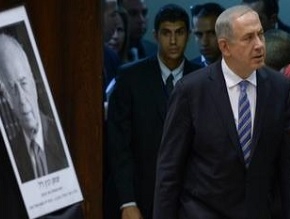|
World Jewish News

Prime Minister Netanyahu at Knesset ceremony for Yitzhak Rabin, October 16, 2013 Photo: Amos Ben-Gershom/GPO
|
Netanyahu: Border must remain in Jordan Valley - like Rabin said
16.10.2013, Israel The government must stand up for its principles and ensure a strong IDF, Prime Minister Binyamin Netanyahu said at a special Knesset meeting in honor of the 18th anniversary of former prime minister Yitzhak Rabin's assassination.
"Our strength is the guarantee for our existence and peace. We do not want an Iranian offshoot in Judea and Samaria. This requires a security border in the Jordan Valley, as Rabin said in his last speech," Netanyahu stated. "This is even more relevant today, when Iran's representatives took over territory we evacuated in Lebanon and Gaza."
The prime minister's comments came a day after Ma'ariv reported that peace talks are currently stuck on the issue of an IDF presence in the Jordan Valley, which the Palestinians oppose, while Israelis refuse to budge on the matter.
"We prefer the current situation over a demilitarized state in a closed cage," Ma'ariv analyst Shalom Yerushalmi quoted a Palestinian official as saying.
Speaking in the Knesset, with Rabin's children and grandchildren after a ceremony at his grave on Mount Herzl, Netanyahu pointed to the IDF's power as essential for the country's long-term survival.
"The government stands up for its principles. It's important that we have the tools to defend our country. Rabin acted to insure the strength of the IDF to ensure our future. Without the IDF, our fate would be like that of our nation in the Diaspora," the prime minister said.
"The IDF stands between us and destruction, even when there are peace agreements."
Netanyahu said there would be no pardon for Rabin's murderer, Yigal Amir, and that he never should be pardoned.
"We learned our lesson, not to have wars and murderers between us. Our leaders knew that this should not happen. That is why we were so shocked [by Rabin's assassination]. It is a warning sign that we must hold in front of the nation," the prime minister stated.
Knesset Speaker Yuli Edelstein spoke of the importance of educating against violence.
"We cannot make the mistake of romanticism, of saying 'it won't happen to us,'" Edelstein said. "We have to prepare the forces to deal with violence on a practical level, immediately. We must explain again and again that violence is not a shortcut. We have to teach adults, youth and children that political violence is an injustice, that it is stupid to take the law into your own hands."
Edelstein admitted that he did not support Rabin's political opinions, but said that the lesson from his assassination is that democracy and political discourse must be strengthened, and that as Knesset speaker, he believes the legislature has an important role in reinforcing those values.
Opposition leader Shelly Yacimovich also emphasized democratic values.
"Ideological debate is the air that democracy breathes, but some things are not controversial. Rabin was murdered for executing the policy for which he was democratically elected to lead. He did not surprise his voters; he did exactly what he promised. That's why he was elected and that's why he was murdered," Yacimovich pointed out.
In order to heal the wounds to democracy, we must remember the violent atmosphere preceding the assassination, she said.
"We didn't know then to what depths we would deteriorate, how demonstrations, which a democracy must allow, became legitimization of murder," Yacimovich said.
The lesson the Labor leader learned from this is the importance of political participation, that "it is not enough to elect a leader every few years and then politically go to sleep."
"The street cannot be left to the extreme fringes. Our job is to protect our leaders and be on the street to prevent it from being looted by extremists," she concluded.
By LAHAV HARKOV
JPost.com
|
|
